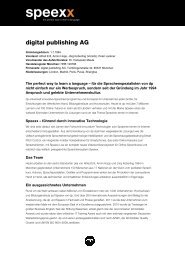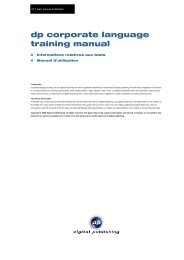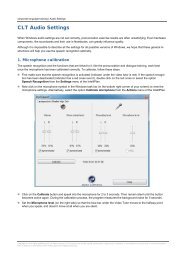download as PDF - Speexx
download as PDF - Speexx
download as PDF - Speexx
- No tags were found...
Create successful ePaper yourself
Turn your PDF publications into a flip-book with our unique Google optimized e-Paper software.
RESEARCH:WHAT THE FUTURE HOLDS FORGLOBAL TALENT MANAGEMENTArmin Hopp shares the research findings of the 'Setting the agenda for global talentmanagement' whitepaper and examines the implications for the L&D sector.As globalisation puts pressure onorganisations to communicateacross borders, more L&Dprofessionals are recognising thedistinct link between bettercommunication, improved talent mobilityand driving productivity.In the recent <strong>Speexx</strong> Exchange 2013 Survey,involving 230 organisations from fivecontinents and over a dozen differentindustries, 88% of organisations consideredcommunication to be pivotal for success.Organisations are slow to embracecloud-b<strong>as</strong>ed learning technologiesThe rapid shift towards a ‘cloud’ ofconsolidated talent management solutionsis transforming learning in terms ofefficacy, flexibility and mobility. Ascloud-b<strong>as</strong>ed technology is helping tocreate a tighter global talent managementnetwork, the future points towardsorganisations adopting one streamlinedprocess that encapsulates the needs of alltheir international counterparts. Despitethe widespread acceptance that cloudb<strong>as</strong>edlearning management systems(LMSs) are here to stay, a significantproportion of organisations are failing toembrace all the resources at hand.Almost half of firms have yet to reap thebenefit of e-learningThe research revealed that only 18% arealready using a cloud-b<strong>as</strong>ed LMS, only 29%feel affected by enterprise resourceplanning (ERP) changes and almost halfApril 2013 Inside Learning Technologies & Skills 125
RESEARCH: WHAT THE FUTURE HOLDS FOR GLOBAL TALENT MANAGEMENT(41%) are still using a local LMS. The surveyalso found that ERP consolidation andcloud-b<strong>as</strong>ed learning have yet to impact allorganisations, with less than a thirdconfirming any noticeable effect.Alarmingly, 47% of organisations surveyedare investing less than a tenth of theirtraining budget in e-learning and have yetto reap the full benefits.Companies are investing in mobiledevices, but not for learningAdded to this, the potential of learning onmobile devices is also lost on manycompanies. Mobile devices such <strong>as</strong> tabletsand smartphones offer new and excitingways of providing flexible, on-demandaccess to learning to employees anytimeand anywhere, but according to the Survey,although 63% of organisations providemobile devices at work, only 27% of theseare actively using them for learning.What this means is that too manyorganisations are walking right into adis<strong>as</strong>trous storm when it comes to learningmanagement. Not only are we seeing <strong>as</strong>ignificant gap between the opportunitiesoffered by technology and its actual usage,but for many organisations, the investmentin learning technology, cloud-b<strong>as</strong>edplatforms and mobile devices is largelyredundant. The troubling result is that endusersare disadvantaged and won’t be ableto reap the complete benefits of a fullyintegrated learning solution.Organisations are not optimising thetalents of their global workforcesThere are still too many organisations withmultinational subsidiaries operating atlocal level in terms of human resourcemanagement. A startling 41% oforganisations surveyed in the <strong>Speexx</strong>It’s all in the data – key trends across EuropeKey findings from the <strong>Speexx</strong> Exchange 2013 Survey of organisationsrepresenting more than 1.6 million employees:1. Refocus where learning budgets are deployed: 47% of internationalcorporations are investing less than a tenth of their training budget in e-learning,despite already reaping numerous benefits. Although 85% believe that cloud-b<strong>as</strong>edlearning will become pivotal in the future, the audit found that the HRmangagement system market consolidation and cloud-b<strong>as</strong>ed learning have not yethad an impact on all organisations, with less than a third confirming any noticeableeffect.2. Improving workforce communications for better performance: There is anincre<strong>as</strong>ed appetite for language training technology, which is indicative of a globalshift towards improved cross-border communication, with 47% of organisationse-enabling language training and 88% deeming communication skills vital forbusiness success.3. Organisations are not fully exploiting the benefits of mobile learning: 63% oforganisations were actively supporting mobile devices in the workplace, but only27% of these actively use them for learning.By using consolidated cloud-b<strong>as</strong>ed talent managementresources, organisations can ensure they are attracting,developing, and managing their staff to optimise their talent.Survey still use local LMSs and another 12%use local solutions for learning and/or talentand performance management. A fifth oforganisations surveyed are still not usingany web-b<strong>as</strong>ed or intranet training systems.This means moving towards a unified lookat the organisation and understanding thecompetencies and behaviours of highperformers across the board. By usingconsolidated cloud-b<strong>as</strong>ed talentmanagement resources, organisations canensure they are attracting, developing, andmanaging their staff to optimise theirtalent. Organisations need to step outsideof silos of localised learning in order toreach a point where talent is defined,competencies of high performersunderstood, and students feel empoweredand confident in their learning anddevelopment.126 Inside Learning Technologies & Skills April 2013
















